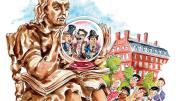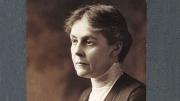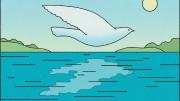Daniel Steiner ’54, LL.B. ’58, died June 11 from complications of chronic lung disease, ending a life of distinguished contributions togovernment and, particularly, education. At amemorial service two days later, his friend David G. Nathan, Stranahan Distinguished Professor of pediatrics and president emeritus of Dana-Farber Cancer Institute, described Steiner as a “physician to institutions.” Among them were Harvard; the New England Conservatory, where he was president at the time of his death; and, at critical moments, this magazine.
In 1969, Steiner had concluded his stint as general counsel at the Equal Employment Opportunity Commission in Washington, D.C., when President Nathan Marsh Pusey, in the wake of the strike and bust at University Hall, called on him to serve as secretary to Harvard’s Committee on Governance. Steiner, Nathan said, found a situation like that confronting Laocoön entwined with the serpents. He was named general counsel in 1970 (adding the title vice president in 1982), and served in that office until 1992. Derek Bok, president for most of that time, now serving as interim president, said, “Both I and Harvard owe him an incalculable debt.”
 |
| Daniel Steiner |
| Jane Reed / Harvard News Office |
Steiner often recalled that, as an alumnus, he had relied on the Harvard Alumni Bulletin’s account of the strike and bust for thorough, accurate coverage of the University in a time of severe trial. In the mid 1970s, when the magazine needed to reorganize financially, Steiner, as general counsel, effected the institutional changes needed to shore up the income statement while securing a suitable governance structure. Crucially, the new entity emerged with clear, statutory protection for its editorial independence.
Later, as president of Harvard Magazine Inc., Steiner led the publication’s centennial celebration in 1998. He commented then: “There have, of course, been some tense moments from time to time when the magazine has run articles or contained elements that the administration would have omitted. In my judgment this independence has been essential in enabling the magazine tobe effective in communicating with alumni.…That the system has worked is a credit to the editors of the magazine who have used the independence responsibly, and to the leadership of the University, who—despite the irritations that inevitably occur—have seen the wisdom of the arrangement and remained true to the principle.”
During the memorial service, Walter Kaiser, Higginson professor of English literature and professor of comparative literature emeritus—a friend since they met as freshmen in Harvard Yard in 1950—quoted comments from friends upon hearing of Steiner’s death. One characterized him as “one of the very few people by whom one wished to be guided.” We were privileged to enjoy Daniel Steiner’s friendship and to benefit from his counsel.
~The Editors





